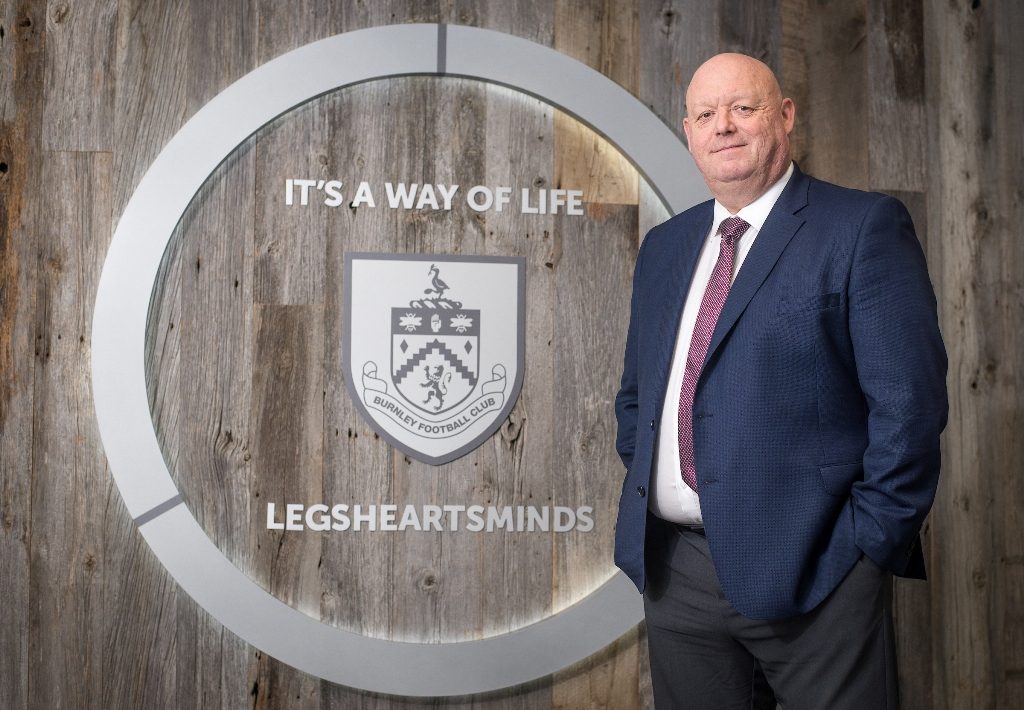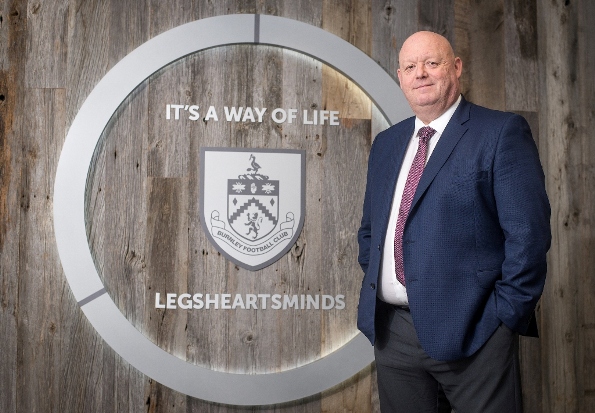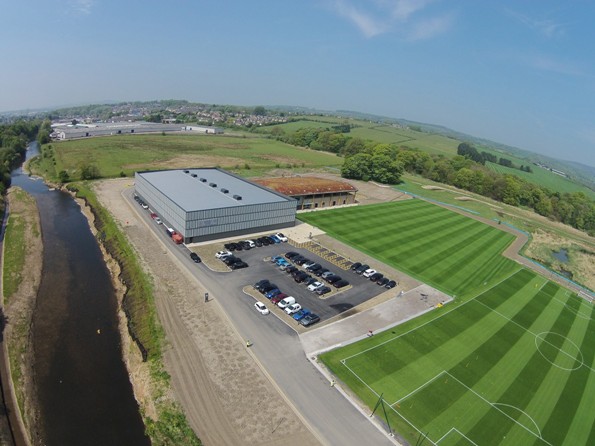What You See Is What You Get

Burnley FC’s Dave Baldwin was our ‘Premier League CEO of the Year’ in 2018. Ian Halstead paid a visit to Turf Moor to discover more about this affable character.
It was a term coined when the internet was in its infancy, Mark Zuckerberg was still in diapers, and tweets meant something only to twitchers, but ‘What You See Is What You Get’ was once a phrase on a million lips. Those words, and the WYSIWYG acronym, eventually fell from favour, but come immediately to mind upon meeting Dave Baldwin.
No dodging questions. No deflection. Not even the over-rehearsed answers which usually pepper the conversations of senior executives. With turnover of £138m in the last financial year, Burnley FC has become a major business – thanks to the achievements of its gravel-voiced manager, Sean Dyche – and Dave’s appointment as CEO in May 2015 reflected its new-found corporate status.
His bone-crushing handshake and stocky physique suggest an old-school rugby league player, but he’s been a football fan from birth, and followed his dad’s footsteps to their local team, Bradford City.

“I dreamed of becoming a footballer,” he said. “I was lucky enough to have a trial with them, and was taken on as a schoolboy at the age of 11, but unfortunately was never good enough to become a professional.”
His move into the corporate environment began with Shire Inns, and a HND in hotel and catering management, which persuaded him to set up a recruitment agency.“I thought I had the right skill-set for that sector and it went very well. When I was 32, I sold the business and retired to Spain.”
For five years, he enjoyed the sun-drenched expat lifestyle and trimmed his golf handicap, but his love for those in claret and amber never dimmed. In 2007, a chance conversation was the catalyst for a return home to his beloved Bantams, and the start of his career in football.
“I’d met an ex-footballer (Mark Ellis) in Bradford. He worked with a local college, and asked if they could send a side out, so I sorted two games for them. Then, Mark Lawn arrived unannounced, said he’d just bought a third of City’s shares, had 50% voting rights and invited me to discuss how I could help the club.”
It wasn’t a tough decision for him, even though Bradford had just been relegated, had been in administration, and had only 3,000 season ticket holders – with just eight players under contract.
“My heart said it was my club and I should return. My mind said I’d built up the right skills to help. My initial plan was to go back for five or six weeks, put together a business plan, and suggest some commercial ideas.”
Instead, Dave enjoyed more than seven seasons at Valley Parade, and the relationships he built with Mark, co-chairman Julian Rhodes, the new manager, Stuart McCall and his deputy, Wayne Jacobs, still flourish today.
“Pricing season tickets to be genuinely affordable was a great success. We won promotion and got to the Capital One Final in the 2012/13 season, beating three Premier League clubs along the way, and sold our first £1m-plus player for more than ten years.”
Out-of-the-blue, Burnley came calling in November 2014, in the shape of head-hunters asking if Dave would like to talk about a new chief operating officer role. The move from Spain to Bradford had been an easy choice, but contemplating crossing the Pennines to Turf Moor was the toughest of his life.
“It was a massive decision – and all about family. I’d married my second wife, Ashleigh, in 2011. Previously, she’d focused on her career, but had reached a point where she wanted to start a family,” he explained.
“However, I’d had a vasectomy after my son’s birth, because my first wife almost died during child-birth and her life would be threatened by another pregnancy. Ash and I have very honest conversations about everything, so we discussed IVF before we married.
“She had three rounds of treatment, and then became pregnant early in 2014. Joining Burnley meant she could have our son, and make a decision about returning to work, as the financial package I could gain here would offset the money she was earning.
“After Ollie was born, Ash chose to become a full-time mum, and she’s now spent more than four years at home, which has been fantastic for them both.”
It’s a reflection of Dave’s commitment to his home city – and his belief in community engagement – that he’s still involved in two major projects back in Bradford. He chairs the council’s Economic Strategy Board, a public-private partnership aiming to generate employment and wealth over the coming decade, and is a non-executive director of the One in a Million charity, which runs a secondary school for some 350 pupils.
“The people there put in all the hard yards, so those roles are relatively easy, and don’t compromise my work here, but family and community is at the heart of everything for me, which is why I love working in football.
“Football is a business, and I enjoy applying my business skills, but over-riding that is the emotion that a football club creates, and the impact it can have on its broader community. It’s not always plain sailing, but if it’s done right, football can be a force for change and for good.”
Change was certainly in the air when, after six months, Dave stepped up to become Burnley’s CEO – after Lee Hoos left for QPR – but not of the good kind.
“We’d been relegated. Danny Ings was out of contract and subject to a transfer tribunal, Tottenham had activated the release clause in Kieran Trippier’s contract, and our captain, Jason Shackell, wanted to leave.”
His challenging start mirrored his arrival at City, but like Bradford, Burnley mounted a promotion campaign as Sean Dyche led the Clarets back to the Premier League. A picture of the title-winning team hangs alongside his desk, but whilst he reflects on their success, he also pays tribute to the club’s decision to commission the grandest project in its long history after relegation.
“It really resonates with me that the board got planning permission for the Barnfield Training Centre in July 2015. It’s an absolute amazing facility, and everyone who sees it is blown away, but that commitment was made with no way of knowing if we’d ever get back to the Premier League.”
The sprawling complex, which opened in March 2017, spans 775,000 sq ft, allowing every player, from youth team novice to a first-team veteran with England caps, to train at the same location.
“Barnfield cost £12.6m, but it’s crucial in terms of future legacy, because we now have Category Two Academy status. The facilities are Category One, but the Premier League will have to formally audit everything before we can be upgraded,” he says.

“We have four hybrid pitches, all costing more than £1m apiece. One is under-soil heated and one is floodlit, so players can train all year round. We also employ two full-time chefs there to create menus under the guidance of the nutritionist and the sports scientist.”
The club has also invested heavily in its non-footballing operations, most visibly in its community programme, led by its CEO, Neil Hart, who arrived at Turf Moor six months before Dave – and from Watford FC whose long-term engagement with its community is much admired.
“We had to catch up with what was happening on the pitch,” he admits. “We had just three people in a small office, but Neil’s team now has 130 full-time staff, and they’ve developed a self-sustaining model, which doesn’t rely on benefactors or football-related revenue streams.
“It’s not a box-ticking exercise, so we can hang a badge on a wall; it’s about delivering programmes which have a positive and tangible impact.”
Burnley FC in the Community’s annual report highlights the scale of that impact, across the town and the neighbouring districts of Brierfield, Colne, Nelson and Pendle. Last year, the charity invested £3.15m into its communities, engaged with 27,215 individuals, involved almost 9,000 youngsters in its Premier League Primary Stars project, and delivered football coaching to just shy of 2,000 young people.
The club is also investing significantly in its historic ground. Upgrading the old stands may still be a way off, but around £8m is being spent, notably to in-fill two open corners to provide modern access for disabled fans. Whilst those improvements are visible, there are also less tangible investments, not least the launch of a Mental Wellbeing Project, which recently saw full-time mental health workers employed in five local secondary schools.
Ultimately though – as with all sports clubs – the aspect of Burnley’s operations which matters most is its achievements when match day comes, and after last year’s impressive 7th place finish which took the club into Europe for the first time in 51 years, this season has been distinctly challenging.
“There isn’t a ‘house view’, but I believe the natural inclination of anyone in elite sport is to compete at the highest level possible, and to achieve the most you can,” he stressed.
“However, the practicality of delivering, with our resources, success on two fronts was a big challenge. Without the Europa League, I believe our early Premier League results would have been better. Sean described the double challenge as ‘creating confusion’, and I’d second his comment.”
Words: Ian Halstead, fcbusiness issue 116




